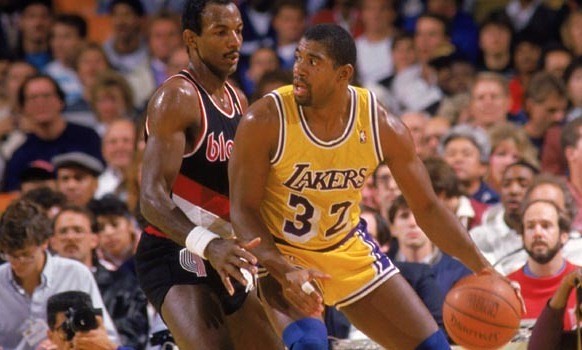For 15 seasons Earvin “Magic” Johnson entertained and
delighted fans of the Michigan State Spartans and Los Angeles Lakers. His
leadership, presence and playmaking propelled teams to six championships and he
earned MVP honors many times over.
He retired from the game in 1991 when he was diagnosed with HIV. Most people thought he was through. Finished. Stick a fork in him. Instead, he treated the disease like any other opponent and prevailed. He even played again in the NBA, answering his detractors and winning over even more fans.
Everywhere Magic goes – from courtside to the C-suite – his
charm is a constant companion. There was little doubt he would leverage that
charisma into business success. When Magic and Guggenheim Partners bought the
Dodgers, people in LA were like “well … sure!” After all, the guy opens doors
and builds bridges.
So I wondered if landing Magic for a panel discussion at the
Milken Global Conference was a big coup, or if he actually seeks out
opportunities like this? (Finding a target-rich environment is akin to hitting
your teammate cutting toward the basket with a perfectly timed skip pass.)
As I sat down to my steak salad several hundred feet from
the stage in the Beverly Hilton ballroom I also wondered if everything they say
about the guy is true. Does he always make a positive impression? Is the
million-dollar smile a put-on or is it genuine? Does he blow smoke, or does he
mean what he says?
By the first sip of iced tea, I was feeling the Magic Love.
The other guys on the panel didn’t stand a chance. Everyone wanted to hear
Magic’s take on the issues of the day.
On Donald Sterling: Magic applauded the Clippers for staying
focused and winning a playoff game the day after the story broke that their
owner told his girlfriend not to bring her black friends to the games. Johnson
said NBA commissioner Adam Silver made the only decision that could be made,
dismissing Sterling from the league. Anything else would have provoked a
walkout, he said.
“Racism has no place in our society, in sports or in the
NBA,” he said, to generous applause. Of his playing days, he said “We didn’t
care what color the guy on our team was, as long as he [could] get the job
done. If his ass couldn’t get the job done, he’s got to go. All I wanted to do
was win the NBA championship, that’s it.”
Magic knows. He suffered racism in his day. And he knows
Sterling; he’s been a guest in his house and even advised him in the past, so
the whole nasty incident seems a bit surreal.
Now more than ever, he said, teams and their athletes need
to recommit to reaching out to their communities.
At one point Larry Fitzgerald of the Arizona Cardinals – no
slouch himself – said something about the upside and downside of social media.
But nobody paid much attention. We were basking in the glow of The Magic Hour.
Everyone wanted to know if Magic will buy the Clippers. His
response: “I will own an NBA team sometime. If the Clippers is the right
situation, then ... " followed by a pause and an ear-to-ear grin that spoke volumes.
At one point Brian France, Chairman and CEO of NASCAR, said
something about the economy and TV hurting attendance. But we were still
thinking about Magic reinventing himself into a business man.
This was the Adoration of the Magic.
People wanted to hear Magic talk about the resurgence of the
Dodgers since his group rescued the team from the evil Frank McCourt.
“Everything we said we would do, we have done. We improved
the stadium, improved the team. Now the Dodger brand has exploded because of
social media.”
He proclaimed that Dodger Stadium is the 8 most Instagrammed
landmark in the world; in fact, the Dodgers are tops in social media by several
different measures. It’s great for the sport and the fans, he said.
All this talk of baseball led moderator Jim Gray to ask “Are
you a basketball guy or a baseball guy?” His reply: “I’m a business man.”
Another panelist, Patrice Motsepe, a South African business
man and legendary soccer owner, said something about sports galvanizing a
community. No one will remember it.
Even when Magic wasn’t speaking, the others were speaking
for him. Fitzgerald paid Magic a high compliment, saying he’s a great example
for players who want to make a successful transition into life after the game.
And that’s how it went for most of the hour: The Magic Show.
Toward the end, NASCAR’s France said he once asked Johnson
“How can you be so nice, so affable to everybody?” And Magic answered with a
story about a man and his son at a Lakers game who were asking players for a
photo. All the players shrugged them off, except Magic. Years later, he
encountered this man in a business setting and against some pretty big odds the
man chose to partner with him because he remembered his gracious act from many
years ago.
Even in the hard-bitten business world, generosity and
humanity win the day.
(Photos: Milken Institute)





